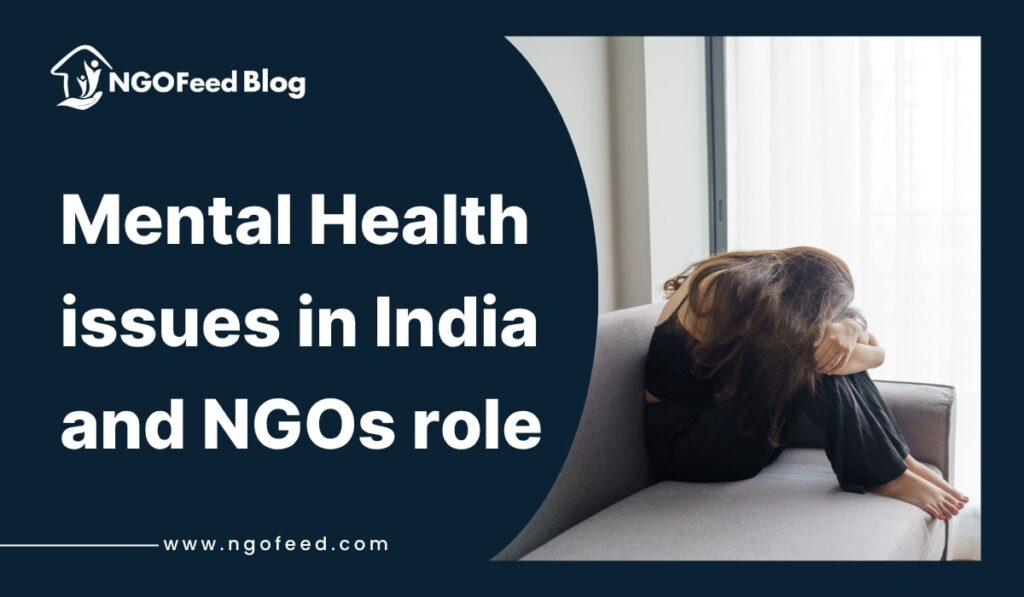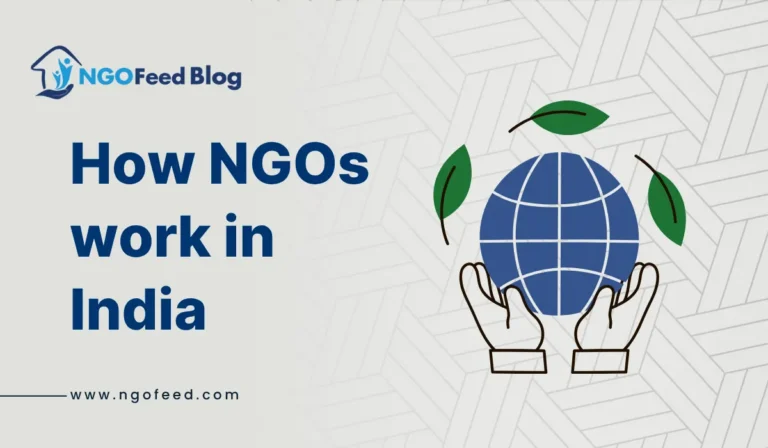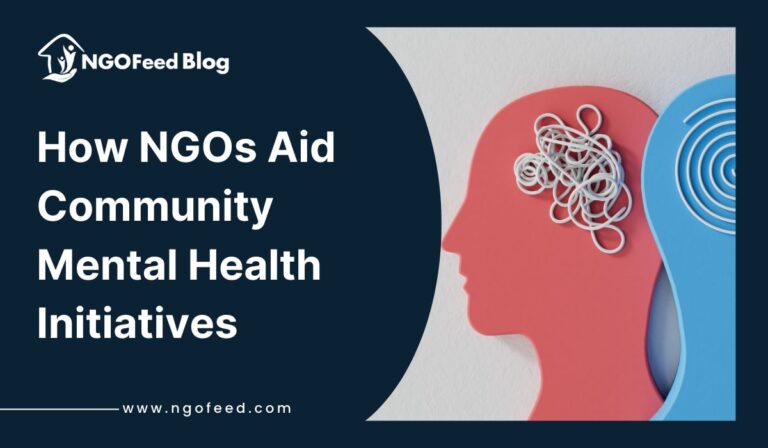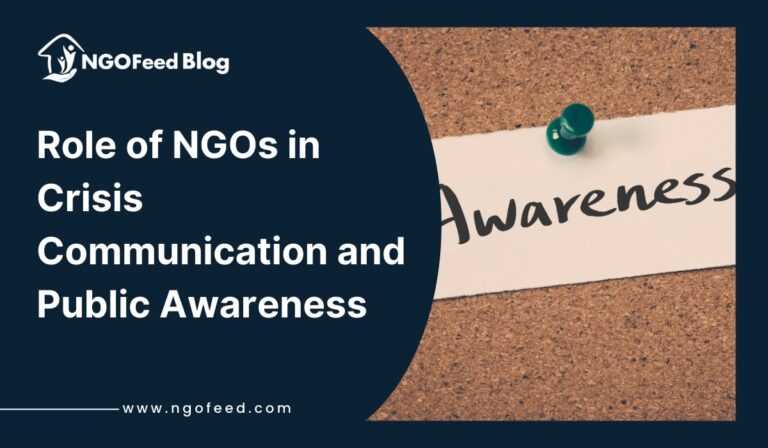Mental Health Issues in India and the NGOs’ Role: Mental health has been a neglected phenomenon in Indian public health, despite its increasing importance being appreciated over the past few years. As the city is getting more urbanised, economically strained, socially pressured, and bearing the long-term impacts of the COVID-19 pandemic, mental health concerns have become more apparent among both age groups and communities. As per the latest estimates, approximately 15 per cent of the adult population in India has some form of mental health disorder, whether mild and depression and anxiety, or extreme as in the case of schizophrenia and bipolar disorder. However, stigma, ignorance, and inadequate infrastructure still bar millions of people from accessing timely assistance.
The role of NGOs mental healthcare system of India has numerous issues: there is a serious lack of mental health professionals, mental health is not properly integrated into primary healthcare, and the psychiatric services are underfunded. In addition, mental illness is a socially stigmatised condition, and many people and families live in silence, not usually receiving treatment or support.
Here, non-governmental organisations (NGOs) have intervened as important players. Through awareness creation, community-based counselling, helplines, and safe spaces, the NGOs in India are filling important gaps that are left by the state systems. They are also on the frontline fighting the stigma by carrying out campaigns, workshops and grassroots interventions so that mental health receives the same urgency as physical health.
This article discusses the extent of mental health challenges in India and the importance of NGOs in raising awareness, providing care, and defining a more empathetic and inclusive mental health policy.
Table of Contents
Understanding Mental Health Issues in India
The concept of mental health has remained a forgotten subject in India, almost a peripheral issue in the Indian social discourse of health. However, the truth is bitter; more than 150 million individuals in India are estimated to require mental health interventions, either via mild to severe support. Some of the most prevalent issues include depression, anxiety disorder, bipolar disorder and schizophrenia, among others, yet the labelling that comes with mental illness continues to keep many victims quiet.
The mental health crisis india is driven by several causes:
- Stigma and Social Barriers -Mental illness is highly misconceived, and therefore, it experiences discrimination and isolation.
- Blistering Urbanisation and Stress – Lifestyle changes, work pressures and economic hardships predispose.
- Limited Awareness– A lot of individuals do not seek help because they are not aware of the symptoms.
- Inequality in Access: Rural communities and disadvantaged populations do not always have access to professional care.
The weight of untreated mental health problems does not only concern individuals but also families, workplaces and society in general. Of concern is productivity loss, the increasing rate of suicide, and intergenerational trauma. The awareness of the magnitude of this problem will be the initial step to a better, healthier, more humane India.
Challenges in India’s Mental Healthcare System
Regardless of the increasing awareness, the mental health system in India is challenged by historical issues that prevent effective intervention and provision of care. The treatment gap in the country has been very high, with almost 80% of the people who are facing mental illnesses not receiving any treatment at all. This is brought about by structural, financial and social barriers that persist to undermine the system.
Key challenges include:
- Inadequate Supply of Professionals– India is not supplying enough, with only 1 psychiatrist per 100,000 population, which is very low compared with the WHO recommendation. Psychologists, psychiatric nurses and social workers are also in dire shortage.
- Urban-Rural Divide: Cities possess some mental health services, but rural regions that feature more than 65% of the population are confronted with little or no specialised facilities at all.
- Minimal Budgetary Allocation: India allocates less than 1% of its health budget to mental health, and therefore, the public institutions are underfunded and poorly equipped.
- Stigma and Cultural Barriers: The ingrained social taboos in society tend to hinder families in recognising mental illness and seeking assistance due to the fear of being shamed and ostracised.
- Low-level Integration with Primary Healthcare– Mental health is often not included in the primary health services which slows early detection and intervention.
- These problems result in the circle of disregard: individuals either silently endure, go to unqualified healers, or find help only when the situation deteriorates. Unless mental health is systemically reformed and adequately invested in, it will continue to be a lower priority in the healthcare system in India. Awareness of these obstacles is a precondition for the development of solutions.
Role of NGOs in Mental Health Issues in India – Advocacy and Care
With mental health services still being underfunded and stigmatised in a country, the NGOs have become important agents of change that fill gaps remaining after the system of public healthcare. They do not just perform treatment, but they are transformative in terms of awareness, advocacy and community-based support.
Key contributions include:
- Awareness Campaigns– NGOs carry out workshops, street plays, and school programs to shatter the stigma of mental health and get people to speak openly and seek help early.
- Helplines and Counselling – NGOs have numerous counselling and helplines that provide free or cheap services to individuals in distress, so they do not feel ashamed of addressing their problems.
- Community-Based Interventions– Grassroots NGOs educate the community volunteers and caregivers on mental illnesses’ early symptoms, so that mental health care can be made locally available in rural and marginalised communities.
- Policy Change Advocacy– NGOs have played a key role in lobbying for more powerful laws, budgetary allocations, and government schemes under the Mental Healthcare Act, 2017.
- Rehabilitation and Skills Development – NGOs offer vocational training and rehabilitation services where people get to fit back into society with dignity.
Through their close contact with communities, NGOs respond to both clinical and social stigma development, developing comprehensive systems of care. Their presence makes mental health human by providing support which is accessible, empathetic, and culturally relatable, which is not always the case with traditional medical institutions. To a large extent, NGOs are not merely sealing the gaps, but they are also defining the future of mental healthcare in India.
Building a Supportive Future for Mental Wellbeing
The course towards a mentally healthier India will not be limited only to treatment, but a comprehensive change in the approach towards mental health within the society and its subsequent support. This is the future of awareness, the access, and the acceptance becoming a part of life, so that no single person feels alone in his or her fight.
The construction of this supportive future has some priority areas, which include:
- Building the capacity of Public Health Systems – Diversifying the intensity of mental health professionals, incorporating the services in the primary healthcare, and enhancing the budgetary allocations are essential measures.
- Scaling NGO Interventions – Effective and successful NGO-led programs have to be scaled up to other rural and marginalised communities by funding, partnership, and technology-driven platforms.
- Education and Early Intervention– Mental health education can be normalised in schools and colleges, and used to detect problems early.
- Workplace and Community Wellbeing – Working and neighbouring environments that are safe and inclusive will help minimise stigma and offer less formal systems of support.
- Policy and Legal Support: increased enforcement of the Mental Healthcare Act and new reforms can make sure that it is affordable, accountable, and protects human rights.
The concerted efforts of government, NGOs, healthcare providers, and communities can help establish the environment in which mental health becomes a priority, as the physical one. A compassionate, inclusive, and conscious future will not only restore people but also make the social and economic development of India stronger. Finally, the development of mental well-being is connected to the ability to establish a society where seeking help is perceived as a sign of strength, rather than a sign of weakness.
Frequently Asked Questions (FAQs)
1. What are the most important mental health problems of Indian people?
In depression, anxiety, bipolar disorder, and substance abuse, mental health among the urban and rural Indian population is one of the most prevalent issues in the country.
2. What makes mental health such a dilemma in India?
There is an 80% treatment gap in India as a result of a shortage of professionals, funding, social stigma, and a lack of awareness, particularly in rural regions.
3. What roles are the NGOs playing in assisting individuals with mental problems?
The NGOs carry out awareness campaigns, offer free counselling services, helplines, lobbying regarding policy change, and rehabilitation and community-based support.
4. In what way does the government contribute to the enhancement of mental health care?
The government tries to make mental healthcare more affordable and accessible through the implementation of certain initiatives, such as the Mental Healthcare Act, 2017 and the National Mental Health Programme. But still, implementation is a challenge.
5. What can people do to make society mentally healthier?
People can contribute by de-stigmatising, engaging with NGOs, fostering mental health discussions, volunteering, and engaging the needy to seek professional assistance without fearing being stigmatised.









